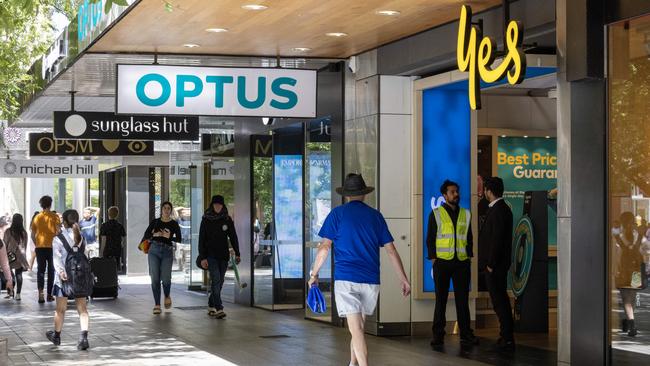Canada’s Brookfield in advanced talks to buy into Optus
Australia’s second biggest telco, Optus, could be partially offloaded to the Canadian private equity titan in a blockbuster deal valuing the company at $16bn.

Australia’s second biggest telco Optus could be partially offloaded to Canadian private equity titan Brookfield in a blockbuster deal valuing the company at $16bn, after its Singaporean owner has been secretly exploring a potential sale for months.
Singtel – which entered a trading halt late on Wednesday – said in a statement to the Singapore Exchange that there was “no impending deal to offload Optus for the said sum”.
But The Australian understands that Brookfield is in advanced talks with Singtel about acquiring a significant stake in Optus – not the whole company.
Singtel bought Optus in 2001 for $17.5m – a fraction of the total cash it has injected into its Australian network and Optus’s net assets, which totals about $10bn, including debt.
The Australian reported in the weeks after Optus’s national outage – which led to tens of thousands of customers leaving for rivals Telstra and TPG – last November that Singtel was exploring sale options.
Singtel revealed last month that the network meltdown cost Optus $61.2m. It dragged Singtel’s overall profit in the three months to December down 13 per cent to $S465m ($527.5m).
The network meltdown – which cut off more than 10 million Australians from phone and internet services – was Optus’s second reputational crisis in 13 months after 2022’s cyber attack.
As well as wiping out small businesses’ profits, almost 2700 Australians could not dial triple-0 for emergency services during the daylong outage.
It ultimately cost former chief executive Kelly Bayer Rosmarin her job. The company is yet to find a permanent replacement, and has since sacked almost 200 staff, with managing director of networks Lambo Kanagaratnam following Ms Bayer Rosmarin out the door.
Optus has also shut down its O-Team, a residential smart devices and EV charger installation business, which was one of its newest ventures.
Singtel has never run a formal sales process but in the last 12 months it is understood to have let the likes of Blackstone, Brookfield and the nation’s biggest superannuation firms know that it is very open to offers for all or parts of its Australian business and has considered an initial public offering.
Optus could be attractive to private equity because of the potential to monetise its infrastructure assets. Bigger rival Telstra sold a 49 per cent stake in its mobile towers in 2021 for $2.8bn, reflecting a massive earnings multiple of 28 times.
In a statement to the Singapore Exchange, Singtel said Optus remained an “integral and strategic part of the Singtel Group” and the “current focus has been on improving network resilience and conducting a CEO search”.
The outage sent Optus’s revenue tumbling 5.4 per cent to $S1.8bn in the three months to December 31. Earnings before interest, tax, depreciation and amortisation eased 1.8 per cent to $S465m.
But Singtel chief executive Yuen Kuan Moon said late last month that he was confident the worst was behind its troubled Australian subsidiary.
“The Optus team has taken steps to increase network resilience since November’s outage. We are confident that our strong balance sheet and our priorities to improve the operational efficiencies of our core business and scale our growth engines will drive long-term value and returns,” he said.
The cost of the outage is yet to match the damage bill from a cyber attack that hit Optus in late 2022. The Australian revealed the data breach cost the telco $140m.
But analysts estimated that shutdown could end up costing Optus $400m, with one of Asia’s biggest banks, Maybank, basing its calculations on past network meltdowns.
“Drawing from the previous outage in 2016, Telstra has offered a $25 credit to consumers and a $50 credit to businesses who were offline for an extended period of time. In our view, Optus might enter a similar enforceable undertaking by ACMA (Australian Communications and Media Authority) to implement a compensation of up to $400m for its affected users,” Maybank analysts said in the aftermath of Optus’s outage.
Many small businesses have rejected the telco’s offer of free data as being “not enough” to compensate for lost profits. Some small businesses lost as much as $10,000 after the outage crippled their operations, including their ability to accept payments and bookings.
The Telecommunications Industry Ombudsman’s latest quarterly data, released last month, showed telco complaints soared in the aftermath of the outage last November. In the three months to December 31, complaints surged 13.4 per cent compared with the previous quarter, and 919 people lodged grievances against the nation’s second biggest telco.
Optus attempted to assuage aggrieved customers by offering $100 of free data. Optus managing director for customer solutions Matt Williams insisted at the time that this was fair, but the offer sparked criticism and anger.
But Telecommunications ombudsman Cynthia Gebert said: “For some people, the offer of free data to compensate for a full day outage is fair and reasonable”.
“But businesses who lost profit, people who couldn’t call triple-0, or who experienced other significant losses told us that free data is not enough.”








To join the conversation, please log in. Don't have an account? Register
Join the conversation, you are commenting as Logout